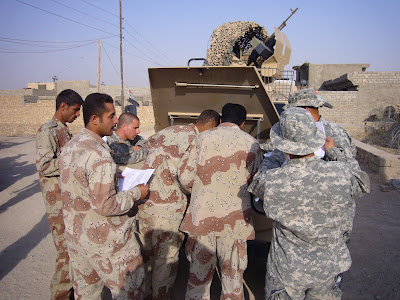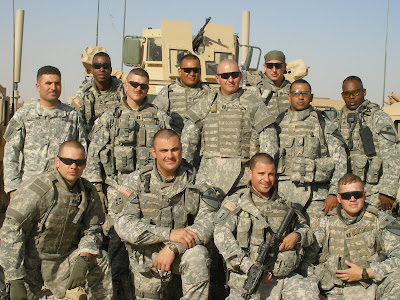
Well, we just celebrated Thanksgiving here at FOB Sykes, my third Thanksgiving in the Middle East in the last seven years. As always the food was outstanding, but nothing compares to being home and seeing the people you love. I even treated myself to a cinnamon roll for breakfast, but no-one comes close to Mom's cinnamon rolls. Unfortunately, being 8 hours ahead of the United States means that alot of Thanksgiving traditions don't really work, for example...The Macy's day parade started at 4 p.m. here, the first football game came on at 8:30p.m. But the chow hall did a great job in preparing a feast, and doing what they could to make us feel at home.
I've decided to use the occasion of a big Thanksgiving feast to continue my series of posts about Iraqi Logistics, specifically food.
When talking about Iraqi Army Logistics, or just the Iraqi Army for that matter, its helpful to first try to explain or understand how things are supposed to work, and then step back an look at how things are actually working. The Iraqi Ministry of Defense has published policies and procedures for how nearly everything is supposed to work. In most cases these regulations read remarkable similar to U.S. Doctrine, unfortunately, the Iraqi culture is much different than the U.S. culture. One quick example, in my efforts to get to the bottom of how food service was supposed to work, I needed to have a contract translated from Arabic to English. Working with one of my interpreters, we sat down to start pulling out the pertinent information, repeatedly he translated the requirements of the contractor as "The contractory should to X, Y or Z" I kept'saying, "Harold, I know the contract doesn't say 'should' it says 'must' or 'will' 'right?," No sir, it says "should." And that is the Iraqi way, as they say..."Inshalla."
- Site Selection. The centralized location chosen by the IA is a U.S. Fob. Force Protection requirements for U.S. bases are very strict when it comes to dealing with local national vehicles and personnel. The means that every truck is completely unloaded and reloaded before it can enter the base. Not only does this lead to long delays in convoys entering the FOB, it also results is bruised produce, meat being left in 130 degree heat for hours while the truck is unloaded and then reloaded.
- Transportation of Food. The Iraqi Contractor who provides the food owns one refrigerated semi-trailer, it is used for storage on FOB Sykes. His food warehouse is located approximately 2 hours north of Tal Afar in the city of Dohuk. In order to restock on FOB Sykes, he must load food from his refrigerated warehouse in Dohuk onto a non-refrigerated semi trailer, negotiate numerous Iraqi checkpoints on his drive south, any one of which may require him to unload his cargo for inspection, then pass through the gates at FOB Sykes, another cycle of downloading and uploading. All told, the food my be outside of refrigeration for upwards of 8-10 hours. Not a big deal in November, but meat left outside for 8-10 hours over here in July or August would probably be cooked Medium Well by the time it made it back into refrigeration.
- Food Storage. Most of the combat outposts are not equipped to store large quanitites of food. Rations are stored on the floor, or in soldiers quarters, or next to the latrine. Refrigeration is also limited at these locations. Most of the COPs have freezers, however when the city power is only on for 8-10 hours per day, cold storage becomes a challenge.
- Cooking Fuel. The life support contract provides barely enough fuel to adequately prepare the food. Some weeks the IA is forced to purchase cooking fuel on the economy in order to prepare their food.
- Portability. While often lamented by American Soldiers, the meal ready to eat, or MRE allows the military to conduct days or weeks of operations without worrying about food. One MRE provides more than enough calories to sustain a soldier for 24 hours. The Iraqi Army has no such equivalent. In order to perform "out of sector" missions, they must pack enough groceries, fuel, pots pans, stoves etc, etc, in order to sustain themselves.
These are just a few of the challenges which are confronted every day just so the Soldiers can have enough to eat. But, perhaps the biggest one is corruption and bribery.
I'm really not sure how to introduce the story, I'm not sure how prevalent things like this are throughout Iraq, I only know what happened in our case. Due to the deployment of the IA throughout the city, our battalion was consistently rating the contractor as only fulfiling approximately 20% of his contract. However, each month he was getting paid as if he were fulfiling 100% of his contract. When coalition forces along with the IA looked into it further it was discovered that although the customer units, i.e. the battalions, were consistently reporting that the contractor was not fulfiling nearly 80% of his contracted resposibilities, by the time the reports were recieved at the MOD in Baghdad, it appeared that he was being rated 100%. Obviously someone was doctoring the assessments, ensuring the contractor was getting paid much more than he should have. In other words, some Iraqi official was being paid off to doctor official reports. Another interesting story regarding the contractor, after this bit of corruption was revealed, a new contract was put out for bid, the old contractor did not renew his bid, or so it seemed, when the winning bidder was revealed it turned out to be the same contractor, he simply changed his company's name.
























